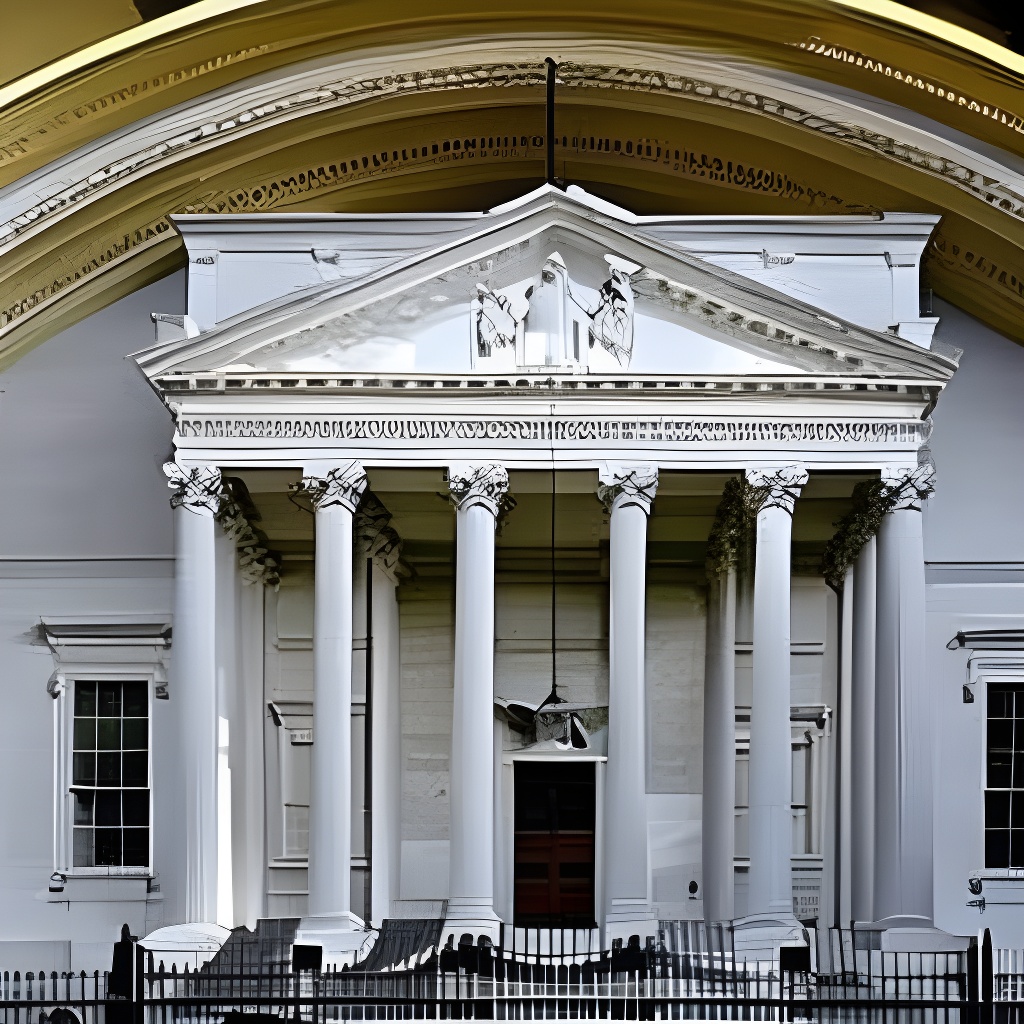
The above image was made with stable diffusion using the prompt 'founding fathers architecture.'
As an adolescent in grades 6-8, I was taught in school to revere the founding fathers. No matter what the lesson was, it was built on the assumption that the United States was free and democratic because of those clever and brilliant men. This obvious hogwash was a standard part of every child's education for a very long time.
Recently a Connor Wood essay informed me that this messaging has been changing dramatically. My first response is to consider that a good thing. Kids should be taught accurate information about the world. But Wood points out some downsides to the specific changes being made to school lessons. Here's a quote:
Forget for a moment about firebrand conservative state governors trying to ban the 1619 Project from schools. The fact is that countries don't work if no one believes in them. You need a baseline of good in your collective story for people to invest in the group; it doesn't have to be rah-rah patriotism, but a laser focus on collective sins and evils will torch people's loyalty. And its effect on impressionable, morally sensitive young people is catastrophic. If, as a young teen, you believe that the country you happen to live in is ethically rotten at its core, where on earth will you find the motivation to accept the roles it asks you to step into?
If kids are being taught that the US is ethically rotten at its core, they probably won't grow up to make choices that stabilize society. And this ethical rottenness itself is far from a settled issue. The founding fathers did what was customary in their era, which is barbaric by modern standards. They were fallible human beings with high ideals.
Although it wasn't great that my generation was taught to revere the founding fathers, demonizing them seems no better. And the new lesson plan does the opposite of what we as a society need right now. Instead of inspiring the youth to fix our broken world, it encourages them to regard that world as the devil, and themselves as its victims.
By a variety of measures, our country isn't really working right now. So of course we've stopped believing in it. And with the cultural shift away from religion, fewer people are believing that there's a god with a plan behind it all. The unifying beliefs in god and country are vanishing, and there's nothing comparably unifying to replace them. The government solution is to beat the drums of war to revive patriotism, which appeals to just a fraction of the population.
I'm not sure I like that. I appreciate diverse perspectives as much as anyone, yet I feel like there should be at least one big story that we can all buy into. A shared story about how we're basically good and working with common purpose towards the country's betterment. If this was our baseline story, all of the same disagreements could still play out, but they'd be doing so in a better larger context.
Unfortunately, society is a dumpster fire. Many people feel like their ideological enemies are responsible for setting the fire. Asking them to consider their enmity in a larger context of camaraderie might be too much. But maybe it's worth a try.
Read my novels:
- Small Gods of Time Travel is available as a web book on IPFS and as a 41 piece Tezos NFT collection on Objkt.
- The Paradise Anomaly is available in print via Blurb and for Kindle on Amazon.
- Psychic Avalanche is available in print via Blurb and for Kindle on Amazon.
- One Man Embassy is available in print via Blurb and for Kindle on Amazon.
- Flying Saucer Shenanigans is available in print via Blurb and for Kindle on Amazon.
- Rainbow Lullaby is available in print via Blurb and for Kindle on Amazon.
- The Ostermann Method is available in print via Blurb and for Kindle on Amazon.
- Blue Dragon Mississippi is available in print via Blurb and for Kindle on Amazon.
See my NFTs:
- Small Gods of Time Travel is a 41 piece Tezos NFT collection on Objkt that goes with my book by the same name.
- History and the Machine is a 20 piece Tezos NFT collection on Objkt based on my series of oil paintings of interesting people from history.
- Artifacts of Mind Control is a 15 piece Tezos NFT collection on Objkt based on declassified CIA documents from the MKULTRA program.
Great post, Mark. Well said and thought-provoking.
I might've told you this, I'm not sure. But I remember being on the committee to create the curriculum for the first ethnic studies program at the high school. I was the only one that spoke up and said the curriculum shouldn't just be about the history of oppression on specific groups of people. We should be talking about the social movements that arose from the struggle, how movements get built, and the ways in which people started working together to make a positive difference. I also mentioned that the last unit should be about present-day applications, like communication skills to talk across differences, reflections on healthy activism etc.
No one responded to my share (at least in the meeting) and it wasn't incorporated into the curriculum. I feel like the potential of an ethnic studies class is diminished when we don't also focus on what we're for, and what unites us despite the oppression.
I also feel like it wasn't incorporated or considered because this layer of education I'm calling for isn't something many people are good at or study, whether it's interpersonal work or organizational/movement building work. Most people like to focus on the problems, and/or take it to the abstract/intellectual level.
Interesting. Thanks for sharing your experience. Bridging divides is indeed hard for people, but so necessary.